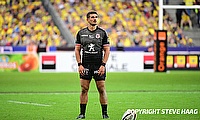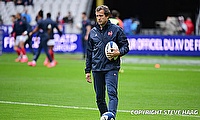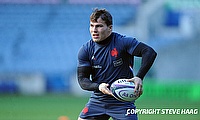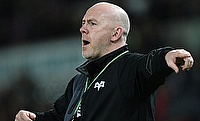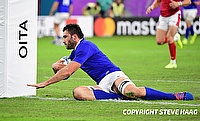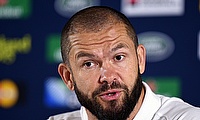Harry Spencer Interview: Why collective thinking in France is helping attract some of rugby's biggest names
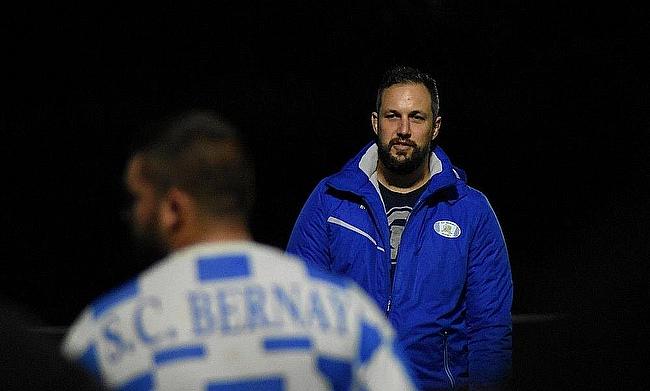
Former Saracens lock Spencer played in Pro D2 and also coaches SC Bernay in the lower levels of French club rugby
©Eveil normand
Last May, all seemed right in the world of Saracens.
In the 2021-22 Gallagher Premiership final, at the first time of asking, Mark McCall's side so nearly climbed back to the top of the English club game. On that occasion, they didn't count on the boot of Freddie Burns breaking their hearts but 12 months later, they were champions again.
After two defeats to begin this season (albeit without most of their stars who were away at the World Cup) five straight wins between the end of October and the end of November suggested it was business as usual for Sarries.
But Sunday's 55-15 thrashing by the majestic Bordeaux Begles punctuated a run of five defeats from their last seven games. That loss in France leaves Saracens with work to do against Lyon this weekend if they are to qualify for the Round of 16 of the Investec Champions Cup while they currently occupy sixth place in the Premiership table.
Injuries woes have certainly not helped their cause, but has the noise surrounding Owen Farrell's future perhaps upset the ambience at the StoneX Stadium?
Since the news broke about Farrell's reported move to France, Saracens have tried to shush the speculation as they aim to recapture some form but Racing 92 boss Stuart Lancaster certainly had tongues wagging again last Sunday when he was quizzed about Farrell swapping London for Paris: "Obviously there have been conversations," said the former England head coach.
"Racing are often linked with key players and I am lucky that my relationship with players from England and Ireland are all part of it, but we'll see. He would be a great signing. Who wouldn't want a player like Owen Farrell?"
Whether the continued chatter around Farrell has affected things at Saracens, only those within will truly know but if this is the beginning of the skipper's goodbye, could anyone blame the 32-year-old for hitting the reset button when you consider what he has given for both club and country?
"I think Owen, he is quite a big family man so France probably makes sense," says Harry Spencer, a former teammate of Farrell's at Saracens who has also played and coached rugby across the Channel for the last 14 years. "I know Stuart Lancaster has worked a lot with Owen in the past so that doesn’t really surprise me.
"I was surprised to see the news but Owen just needs to look at what he wants out of the rest of his rugby career because he has done a lot. He can either look to go and break records for England and for Saracens in the Premiership or he can look beyond that and go for maybe a bigger paycheque, more comfort later in life and a different life experience. We will see."
Back in November, Farrell decided to take a period of indefinite leave from international rugby to look after his and his family's mental health following the abuse he received during the World Cup.
And at England's Six Nations squad announcement on Wednesday, head coach Steve Borthwick shared his thoughts on Farrell's potential exit from Saracens: "I spoke with Owen yesterday (Tuesday) and I think what’s important is that Owen makes a decision that’s right for Owen and his family," he said.
"Will a player of Owen’s calibre be missed if he chooses to play outside England? Yes, of course. Do I want him in some point in the future to come back? Yes. But I also want him to do what’s right for him and his family and have the experiences and the memories that that he wants to make.”
But what makes a move across the Channel so appealing for players? People will immediately point to the pound signs but as Spencer explains, the French live and breathe their rugby with the sport's popularity and stature in the country only increasing.
The excitement around the national side continues to grow under Fabien Galthié - with Les Bleus favourites to win the upcoming Six Nations with some bookmakers - while in European club competition, both the Champions Cup and Challenge Cup are currently in the possession of Top 14 clubs La Rochelle and Toulon, respectively.
And domestically, France have a league structure that is seemingly the envy of others and it is continuing to attract some of rugby's star names. The likes of double World Cup-winning captain Siya Kolisi linked up with Racing this season and Farrell may follow suit, but below the top division, players such as Wales international and British and Irish Lion George North has opted to ply his trade in Pro D2 rather than stay in the UK.
North will join Provence from next season and it was suggested earlier this month that Northampton Saints' Courtney Lawes could do the same. The Daily Mail reported that it understood the 34-year-old had recently visited the second division club to assess the facilities and speak to staff.
Spencer - who played for both Tarbes Pyrenees Rugby and Rouen in Pro D2 - believes the cohesive thinking that underpins French domestic rugby is a key reason why some of the most recognisable names in the sport are attracted by a move to France.
"What is really important to understand is the organisation of French rugby. It is the only country that has a fully professional second division in the world," Spencer says.
"They work with the LNR (Ligue Nationale de Rugby) so when they make decisions, there are 30 teams around the table - the Top 14 and the Pro D2 - making decisions for the collective in terms of TV rights, distribution of sponsorship money etc.
"There is that understanding that the strength of the Top 14 and French rugby is not just the first division. It comes all the way down the pyramid.
"The second thing which makes clubs financially strong is the support they get from the local authorities as well as entrepreneurs or business owners. You will go to places like Beizers who have Stade Raoul-Barrière which was used in the 2007 World Cup. It is an epic stadium and it is owned by the local council. French local councils have these ridiculous facilities and they let clubs use these facilities at zero cost.
"Clubs do start with a very strong basis and the whole eco-system of French rugby is geared towards supporting clubs and them being financially healthy.
"If you then flip that to the player, you’ve got a club that has got nice facilities, who have got money to give you combined with nice weather, especially in Provence, and you’ve got the change of lifestyle.
"On the pitch, you have got slower seasons, especially in Pro D2. They do blocks of four or five games - which are all televised by the way - and then you have a week off so in terms of an older player, it is definitely an attractive proposition in terms of workload, game time, game management and lifestyle for you and your family. It all adds up."
Spencer explains the competition in Pro D2 is also healthy with Valence and US Dax - who came up this year - currently holding their own while his old side Rouen, as well as clubs such as Angouleme and Nevers, have gained promotion and succeeded.
Even Nationale - the third division of French rugby which was introduced in 2020 - includes "clubs like Narbonne, Albi, Bourgoin-Jallieu who have been in European competition relatively recently and you’ve got Massy and Tarbes who have been in Pro D2 recently" which, as Spencer goes on to reiterate, is only building strength down the pyramid.
So an aligned vision for the domestic game, central and local support, a nice salary, a good level of competition and a bit of sunshine all sound like plus points for players who might be pondering a move to France rather than continuing their careers on these shores.
Spencer does admit adapting to a new culture, avoiding feeling isolated and learning a new language do throw up their obvious challenges but on the whole, the positives outweigh any negatives.
Back in 2010 for Spencer, competition for places at Saracens - along with his own injury problems - were some of the reasons why the former lock forward decided to move to France, as well as taking the opportunity to experience a new way of life.
Fast-forward to the present day and the different factors Spencer has listed, combined with the financial obstacles in the English domestic game in particular, may all play a part in any decision-making process for a current player.
Only recently, Henry Arundell - one of England's most exciting talents - signed a contract extension at Racing after joining the club following London Irish's demise while Lewis Ludlam (Northampton), Kyle Sinckler (Bristol Bears) and Jonny Hill (Sale Sharks) have been linked with transfers to Top 14 sides ahead of next season. If those reports are to be believed, then at least a quarter of England's World Cup squad could be based in France.
One plus point for the Premiership was news that new England captain Jamie George is staying put. The 33-year-old is understood to have been close to moving to the Top 14 but has signed a two-year extension at Saracens and became the first player to be offered a hybrid contract by the RFU.
"I think it [George staying at Saracens] is a real positive step,” Borthwick said on Wednesday. “And I think it’s a real good sign that English rugby, while there’s still some way to go, has potentially turned a corner. I think you’ve all seen that in terms of the positive nature of English rugby in terms of what we’ve seen so far this season. To have the captain of England commit his future to English rugby is an important step."
George pledging his immediate future to Saracens and to England has to be seen as a positive but listening to Spencer, it is very easy to see why a move across the Channel might be appealing.
And with speculation swirling around Farrell, Sinckler, Lawes et al, it does seem like the exodus of some of the Premiership's top talent to France isn't coming to an end anytime soon.


